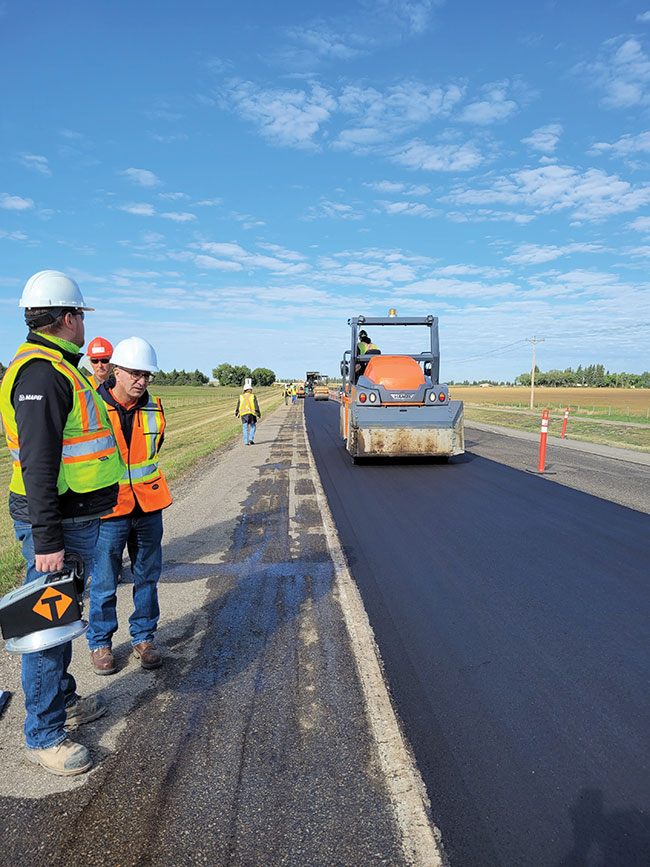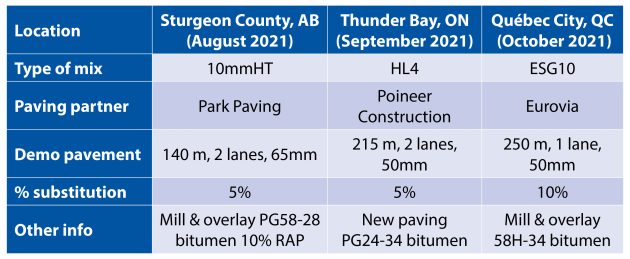
Features
Roads & Paving
Technology
Lignin, a pulp by-product, could help build greener roads
FPInnovations working on lignin-based asphalt mix
February 1, 2022 By Andrew Snook
 FPInnovations is working on a way to replace some of the bitumen in asphalt mixes with lignin. (Photo: FPInnovations)
FPInnovations is working on a way to replace some of the bitumen in asphalt mixes with lignin. (Photo: FPInnovations) A leader in research and development in Canada’s forestry sector is currently working on a way to create greener roads with the help of lignin.
FPInnovations, a private not-for-profit organization that specializes in the creation of solutions in support of the Canadian forest sector’s global competitiveness, are working on a way to replace some of the bitumen in asphalt mixes with lignin, a natural by-product in the manufacturing of pulp. Lignin is considered a natural wood glue that binds together the cellulose fibres in plants.
FPInnovations believes that lignin can potentially serve the same purpose in asphalt pavement and help reduce the amount of bitumen needed in asphalt mixes.
The organization acknowledges that there are two significant hurdles that come with trying to replace bitumen with lignin.
Combining bitumen and lignin
The first challenge is that it is still not entirely understood how a combination of bitumen and lignin will react in cold weather. Until recently, the combination had only been tested in milder winter conditions in areas of Europe (upwards of 50 per cent bitumen replacement). That changed this past fall, when the City of Thunder Bay paved a section of the Mapleward Road landfill with a bitumen-lignin asphalt pavement.
The location was an ideal choice as there is a nearby supply of lignin available courtesy of FPInnovations’ and Resolute Forest Products’ thermomechanical pulp bio-refinery that was commissioned in 2019.
“We are very happy to be part of this project and to contribute our knowledge,” stated Fred Hakala, general manager of Pioneer Construction, field test partner in Thunder Bay, Ont. in a recent release from FPInnovations.
“Tests must demonstrate that the product obtained from the substitution of bitumen with lignin will offer equivalent, if not superior qualities to the existing products, but the economic impact must also be clearly evaluated, for both asphalt producers and customers.”
RELATED: McCloskey creates new recycling and environmental brand
In Northern Alberta, Sturgeon County also chose to participate in running a pilot project this past fall using a lignin-modified mix with the assistance of field test partner Park Paving, headquartered in Edmonton.
“We are excited to participate in a project bringing sustainable products to the marketplace,” stated Richard Hart, general manager at Park Paving in a recent release from FPInnovations.
“Our climate requires specialized materials to withstand the many freeze-thaw cycles, and the quality of asphalt cannot be compromised as a result of bitumen substitution. The final product must meet or exceed current specifications as well as provide a positive economic impact for the rate payer.”

If a formulation is used where five to 10 per cent of the bitumen is replaced by lignin, and there ends up being a 20-per-cent market penetration of the new asphalt product, it could potentially generate an annual demand of 40,000 to 80,000 tonnes of lignin that could open up a new market for high-value lignin from Canadian kraft pulp mills.
The percentage of lignin being substituted for bitumen at the Thunder Bay and Sturgeon County pilot projects is five per cent, while a third pilot project that recently got underway this past October in Quebec City has a 10-per-cent lignin substitution for bitumen (Eurovia is the paving partner on this project). The pavement for all three pilot projects will require significant amounts time to be tested thoroughly.
“For all sites, monitoring will last several years to assess the performance of the lignin-modified pavements under different climatic variations,” says Marie-Claude Thibault, communications specialist at FPInnovations.
The second challenge will be integrating lignin into the asphalt production processes. FPInnovations has undertaken this challenge and is currently working alongside several members of the asphalt value chain, including governments, universities, process specialists and lignin and asphalt producers.
FPInnovations Transportation and Infrastructure group lead researcher Allan Bradley says that the early results are promising.
“Finding the right percentage of lignin to substitute for bitumen while improving asphalt performance attributes such as fatigue strength, rutting resistance, pull-out resistance, resistance to crack degradation, noise (tire-to-road contact), and load-bearing capacity will be key to the project’s success. Additional lab testing will also focus on verifying how lignin can affect asphalt thermal cracking performance, a critical property to improve in our climate,” he says.
In addition to being able to meet industry standards for quality in the final products, FPInnovations will also have the challenge of trying to enter a market where bitumen is a tried-and-true product that is commonly used and well known by all members of the asphalt industry.
FPInnovations recently stated that it has initiated discussions with asphalt producers and other key players to try and solve this challenge. FPInnovations is also in discussions with the City of Edmonton and the Province of British Columbia to perform additional pilot projects.
“These upcoming field trials are intended to find the optimal mix formulation that achieves performance improvements while minimizing negative impacts, using compounds that will keep the final product competitively priced,” Bradley says.
Available materials
FPInnovations stated that if a formulation is used where five to 10 per cent of the bitumen is replaced by lignin, and there ends up being a 20-per-cent market penetration of the new asphalt product, it could potentially generate an annual demand of 40,000 to 80,000 tonnes of lignin that could open up a new market for high-value lignin from Canadian kraft pulp mills.
In Hinton, Alta., West Fraser already produces sustainably produced lignin at its pulp and paper plant through a process generated by the LignoForce System, which was jointly developed by FPInnovations and NORAM Engineering.
“We are thrilled to see the preliminary results from field trials using the lignin produced by our plant,” stated Rod Albers, manager for energy and bio-product development for West Fraser in a recent release from FPInnovations. “This is an important step towards achieving an efficient product made from natural, renewable material derived from Canadian forest fibre that performs in the challenging weather conditions roads experience.”
In addition to creating a new market for Canadian forest products, the environmental benefits would be significant. FPInnovations stated that if it is feasible to substitute five to 10 per cent of the bitumen in a typical asphalt mixture with lignin, it could reduce CO2 emissions in the range of 16,000 to 31,000 tonnes annually; and on a national scale it could reduce GHG emissions in the range of 117,000 to 260,000 tonnes of CO2 eq. annually.
Print this page

